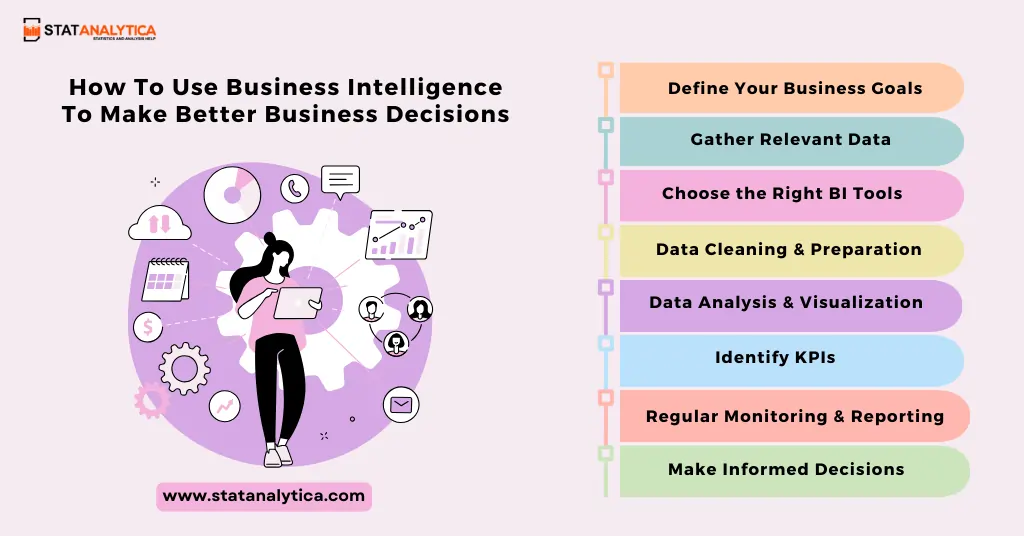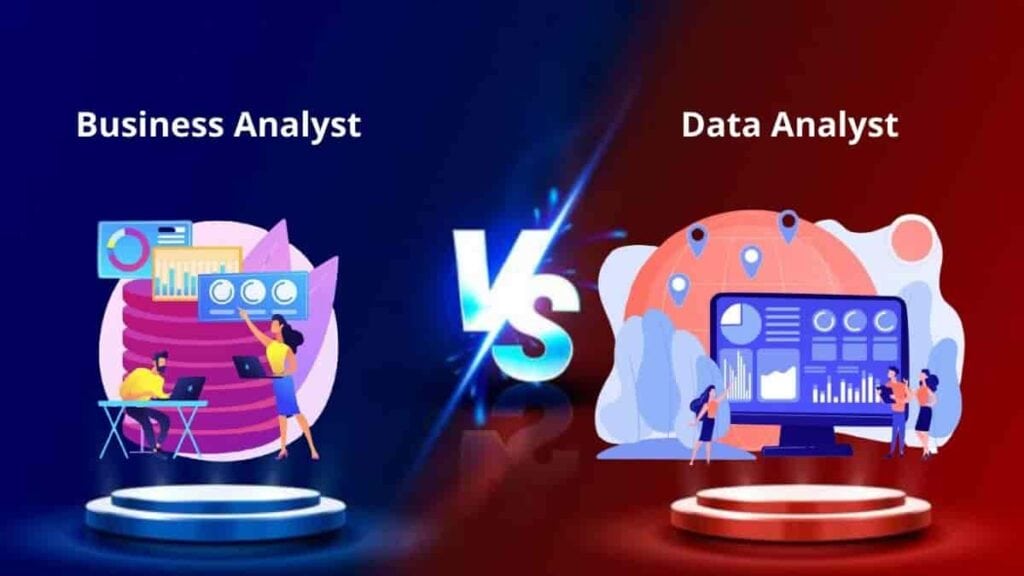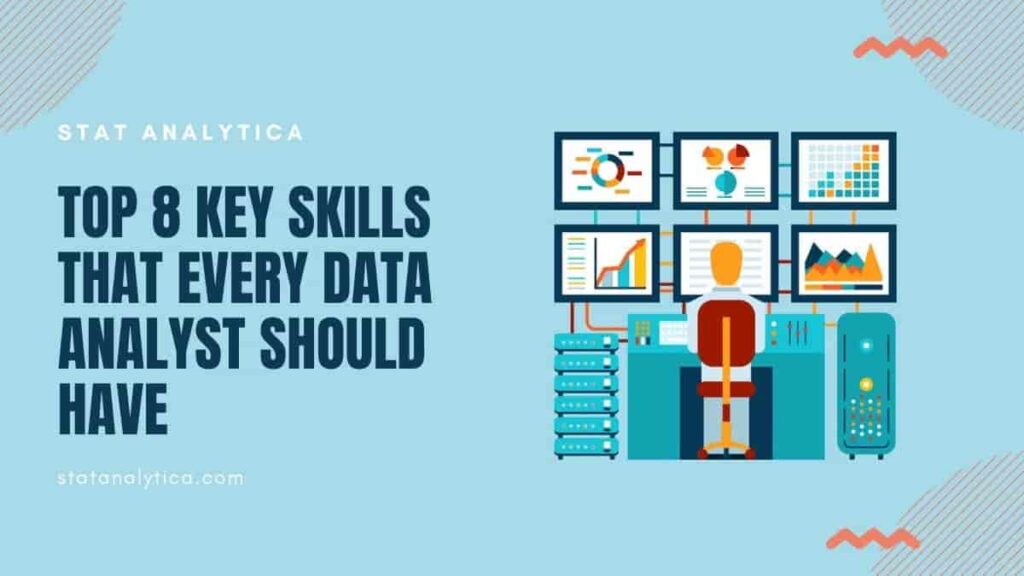In today’s computerized world, Business Intelligence is the compass that guides successful businesses. Business intelligence is the term for the processes and tools that turn raw data into information that is useful for business. It is like a secret recipe for making informed decisions in the business world.
In addition, business data is beneficial and helps the companies to make better decisions in situations of competition. It provides a competitive edge by allowing you to analyze past data, monitor current trends, and predict future opportunities.
In this blog, we will discuss the various terms of business intelligence, explaining what it is, why it is important for businesses, and 7+ simple steps on how to use business intelligence to make better business decisions in 2023. Furthermore, we will talk about the practical steps of using BI to enhance your decision-making power and introduce you to 5 powerful BI tools that are transforming the business landscape.
Stay tuned with us to know more about how to use Business Intelligence to make better business decisions.
What Is Business Intelligence?
Table of Contents
Business Intelligence is an approach for businesses to gather and use the raw data to make better business decisions. For instance, you have a puzzle, and each piece of the puzzle is part of your business, for example, customer information, sales, and costs. By collecting, organizing, and analyzing the data and making them into useful information helps businesses to make better decisions. Business Intelligence helps you to keep these pieces of puzzles together. This is like having a plan for your business that shows you where it is doing well and where it needs work.
In addition, to make the data in an easy-to-understand manner and extract some valuable information. This information is extracted with the help of business intelligence tools using graphs, reports, and charts. These tools can help the organization to see the trends of sales, revenue, losses, etc., and help to spot upcoming business problems and make plans for the future. On the other hand, business intelligence is a helpful thing to improve the business by using data, and with tools, it will turn into a piece of useful information.
Why Business Intelligence Is Important For Business?
Here are a few reasons why business intelligence is important for business:
1. Informed Decision Making
Business Intelligence helps businesses make choices based on facts, such as market trends and customer preferences.
2. Improved Operational Efficiency
Business Intelligence automates data tasks, boosting productivity and resource allocation. For instance, manufacturing plants use BI to reduce downtime.
3. Enhanced Customer Insights
Business Intelligence looks at information about customers, like what they’ve bought in the past, to customize goods and marketing strategies. For advertising, restaurants find out what foods are most popular.
4. Competitive Advantage
Business Intelligence keeps businesses ahead by spotting opportunities and threats early. For example, tech companies adjust strategies based on competitors’ actions.
5. Financial Performance Monitoring
Business Intelligence tracks finances in real-time, aiding financial planning and risk management. Financial institutions adjust lending practices to maximize returns.
Read More
Benefit Of Using Business Intelligence To Make Better Decisions
Here are some benefits an organization have if they use business intelligence:
1. Better Choices with Data
Business Intelligence helps you make smarter decisions because it takes information from different places, like sales and customer feedback, and makes it easy to understand in reports and charts.
2. More Accurate Decisions
Business intelligence tools make your choices more accurate. Instead of guessing, you can use facts and numbers. For example, you can see which products sell the most and use that information to make better decisions.
3. Quick Decision-Making
It makes decisions faster. It does the hard work of looking at data quickly, so you don’t have to spend a lot of time. This is important because it helps you react faster to changes in the market.
4. Enhanced Competitive Advantage:
Business intelligence helps you beat your competitors. By watching what’s happening in the market and how customers act, you can find new chances or problems early. This helps you be better than others in your business.
5. Save Money
It can help you spend money more wisely. For example, it can show you where you are spending too much or too little. This helps you use your money better and make your business stronger.
Steps On How To Use Business Intelligence To Make Better Business Decisions

Here are some simple and best steps on how to use business intelligence to make better business decisions:
Step 1: Define Your Business Goals
In this step, you should take the time to clearly spell out what you want to achieve with your business. Think about the specific problems or challenges you are facing and how business intelligence can help. For instance, if you are struggling with selling more products or services, or if you want to figure out how to spend less money, or even how to make your customers happier, these are the types of goals you should define. Having well-defined goals is like having a roadmap that shows you where to go.
Step 2: Gather Relevant Data
Here, you need to gather all the information that can help you reach your goals. This data should come from different parts of your organization, like sales records that show what you have sold, customer feedback that tells you what people think, financial statements that track your money, and more. Think of data like puzzle pieces; you need all the right pieces to see the whole picture. Make sure the data is accurate and up-to-date because using wrong or old data can lead you in the wrong direction.
Step 3: Choose the Right BI Tools.
Selecting the right BI tools is like picking the right tools for a job. You need software that can handle your data well and do things like turning numbers into easy-to-understand charts and reports. Some tools, like Tableau, Power BI, and QlikView, can help with this. Picking the right tool is crucial because it’s like having the right tool in your toolbox – it makes your job easier.
Step 4: Data Cleaning and Preparation
Before you start looking for answers in your data, it’s important to clean it up. Think of this step as tidying up your workspace before getting to work. You need to remove any duplicate or repeated data, fill in any missing information, and make sure everything is consistent and organized. Clean data ensures that your analysis is based on a solid foundation, like building a house on a strong, level ground.
Step 5: Data Analysis and Visualization
Now comes the exciting part: using your BI tools to explore and make sense of your data. Imagine your data is a big treasure chest; analysis is like opening the chest to see what’s inside. You can create visual representations like charts, graphs, and tables to help you understand the data better. It’s like turning a bunch of numbers into a story that’s easy to follow and learn from.
Step 6: Identify Key Performance Indicators (KPIs)
Key Performance Indicators, or KPIs, are like scorecards for your business goals. They are specific numbers you can measure that tell you how well you’re doing. For example, if your goal is to sell more, your KPI might be the number of products sold each month. If it’s about keeping customers happy, your KPI might be the customer satisfaction rating. These KPIs act as signposts on your journey, showing you if you’re headed in the right direction.
Step 7: Regular Monitoring and Reporting
Once you have set your KPIs, you need to monitor them regularly. This is similar to checking your car’s dashboard while driving to make sure everything’s running smoothly. You can set up alerts or notifications to warn you if something’s not going as planned. Regular monitoring helps you catch problems early and make adjustments to your strategies before they become big issues.
Step 8: Make Informed Decisions
With all the information, analysis, and KPIs at your fingertips, it is time to make smart decisions. Think of this step as choosing the best path to reach your destination. You use the insights gained through BI to adapt your plans, allocate your resources wisely, and guide your business toward success. Like a navigator, you regularly review and update your BI processes to ensure you stay on course and prepared for any changes in the market.
5 Business Intelligence Tools That Are Used To Make Better Business Decisions
Here are some best business intelligence tools that are used to make better business decisions:
1. Sisense
2. Microsoft BI
3. Dundas BI
4. Qilk
5. Datapine
By using these tools an organization makes the better decisions to grow the business.
Conclusion
Knowing how to use business intelligence for better decisions is vital. Business intelligence, or BI, helps companies gather and analyze data to make smart choices. It is essential because it provides real-time information, spots trends, and predicts the future. BI boosts efficiency, profit, and customer satisfaction.
Moreover, to use BI effectively, collect data, analyze it using BI tools, and turn insights into actions. There are many BI tools available, like Tableau, Power BI, and QlikView, which make data easy to manage and visualize. In a nutshell, using BI is not just an option; it is a must for informed decisions and long-term success.


